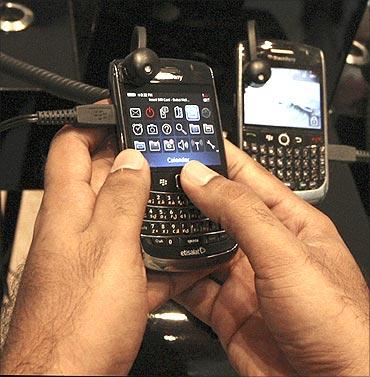
BlackBerry manufacturers have suggested forming of a joint consultative forum comprising government, users and service providers for drawing up procedures to intercept services likes Enterprise Mail as banning the service would be 'counterproductive'.
In a letter to Cabinet Secretary K M Chandrasekhar, Canada-based Research In Motion, makers of BlackBerry, virtually refused to provide an intercepting technology for its BlackBerry Enterprise Server and said it had provided options to Law Enforcement Agencies within India's existing techno-legal framework.
. . .

The RIM said the BES service uses standard technology which was no different from any of the other encryption products used to provide Virtual Private Network on both wireless and wired networks.
RIM said it also strongly believed that the concerns of LEA and the government can only be effectively addressed in a wider dialogue between government and industry.
"Singling out products like BES in the present instance and imposing ban on such services would be futile and counterproductive," vice president of RIM Robert E Crow said in the letter.
. . .

The RIM said the ban would be futile as anyone who wanted to misuse of Internet encrypted technology would shift to any one of other numerous and freely available options.
The step would be counterproductive because any ban or suspension of services like BES, which have played a key role in success of modern business, will affect information security and efficiency of both commercial and government organisations.
Government has given a time of two months to BlackBerry for providing technology for intercepting its BlackBerry Messenger service and BES.
. . .

"As this issue impacts the Internet industry as a whole, we at RIM therefore earnestly request that a joint consultative forum, of government, users and providers of encrypted services, be established for collectively engaging and assisting the government to draw up procedures and process that will be adhered to across the board to address the concerns of LEA and the misuse of such technologies," Crow said.
The BlackBerry manufacturers claimed that the approach was necessary because the network operators and service providers do not have clear access to target information as the users have.
". . .as we understand it, many of these users also want the opportunity to directly engage with the government to find solutions," Crow said.